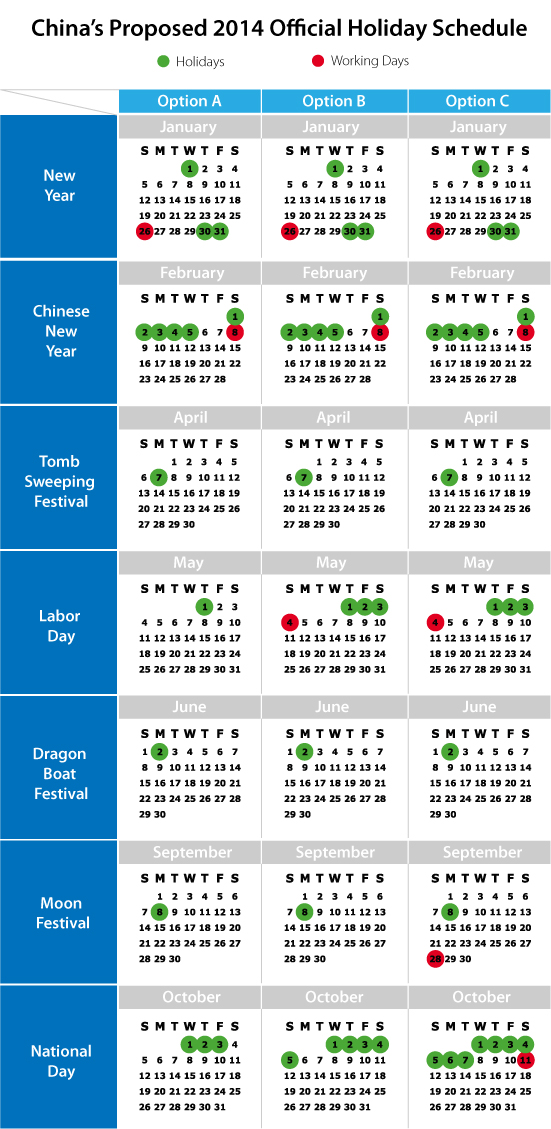China Releases Three Proposals for 2014 National Holiday Schedule
Nov. 29 – China’s Office of National Holidays (ONH) is allowing the public to choose between three different proposals for the 2014 national holiday schedule. In an attempt to make the holiday schedule more predictable, the public is currently being asked to indicate their preferred proposal in an online poll featured on a number of leading Chinese websites including Sina, Tencent and Sohu.
As of Thursday, more than 1 million people have participated in the poll that has been available online since Wednesday November 27.
In a similar survey conducted in October, only 12 percent of roughly 2 million participants indicated that they were satisfied with the current national holiday arrangement, and a further 50 percent felt that mandatory long-term holidays that sacrificed regular weekends were unnecessary.
In recent years, the ONH has been criticized for its late release of the holiday schedule, and weekend-working day switches that sometimes result in employees being required to work seven or eight days straight in order to have three or seven consecutive days off. In January 2013, for example, the ONH scheduled the New Year’s holiday from January 1-3, a Tuesday through Thursday, resulting in the public being expected to work for eight consecutive days from January 4-11.
The ONH’s decision to conduct an online poll is both a response to this criticism, and an attempt to make the official holiday schedule more predictable.
The tendency for the ONH to not release the official holiday schedule until late December oftentimes places employers and employees under a great deal of pressure to predict when longer holiday breaks will be, and plan working days accordingly. Because one or three-day holidays are typically combined with their closest weekends to create longer vacations, planning working days around the holidays can be especially difficult.
The three proposed options can be found below:

It appears, however, that many in China are disappointed by all three “reformatory holiday schedules.” Rather than increase the total number of national holidays as expected, the proposals all feature the traditional 11 days off and retain many of the unpopular weekend-working day switches.
Early results indicate that more than 50 percent of participants favor ‘Option C,’ while ‘Option B’ is the least popular. Option C retains the traditional long holidays for Chinese New Year and National day while avoiding some weekend-working day switches.
Because some Chinese employers fail to respect labor laws requiring workers to be granted annual leave, long national holidays are sometimes the only opportunity employees have to take a real vacation. Consequently, China’s retail and tourism industries have come to rely upon the long national holidays for growth. Shen Danyang, Spokesman for China’s Ministry of Commerce, recently highlighted the boost ‘golden week’ gives China’s economy each year by increasing national consumption.
While the public contemplates how to take holidays in a more reasonable way, changing the holiday schedule will inevitably create issues for manufacturing and trade companies trying to predict working days and salary requirements. Under China’s current labor law, employees must be paid triple for time worked during national holidays.
Dezan Shira & Associates is a specialist foreign direct investment practice, providing corporate establishment, business advisory, tax advisory and compliance, accounting, payroll, due diligence and financial review services to multinationals investing in emerging Asia. Since its establishment in 1992, the firm has grown into one of Asia’s most versatile full-service consultancies with operational offices across China, Hong Kong, India, Singapore and Vietnam as well as liaison offices in Italy and the United States.
For further details or to contact the firm, please email china@dezshira.com, visit www.dezshira.com, or download the company brochure.
You can stay up to date with the latest business and investment trends across China by subscribing to Asia Briefing’s complimentary update service featuring news, commentary, guides, and multimedia resources.
Related Reading
 Human Resources and Payroll in China (Third Edition)
Human Resources and Payroll in China (Third Edition)
A firm understanding of China’s laws and regulations related to human resources and payroll management is essential for foreign investors who want to establish or are already running foreign-invested entities in China. This guide aims to satisfy that information demand, while also serving as a valuable tool for local managers and HR professionals who may need to explain complex points of China’s labor policies in English.
 Social Insurance and Payroll
Social Insurance and Payroll
In this issue of China Briefing Magazine, we take a “back to basics” approach to China’s mandatory benefits. Where, exactly, is that extra 35-40 percent on top of an employee’s salary going? What are social insurance contribution rates, base amounts, and tax exemptions? How does all of this figure into the payroll process? We next look at mandatory benefits as a piece of the larger payroll puzzle, with highlights on two very China-specific pieces: FESCOs and hukou, China’s “domestic passport.”
- Previous Article Zhejiang Releases Measures to Ease Company Registration
- Next Article Yunnan and Guangxi Launch Financial Reform Pilot Zone Targeting ASEAN and South Asia









